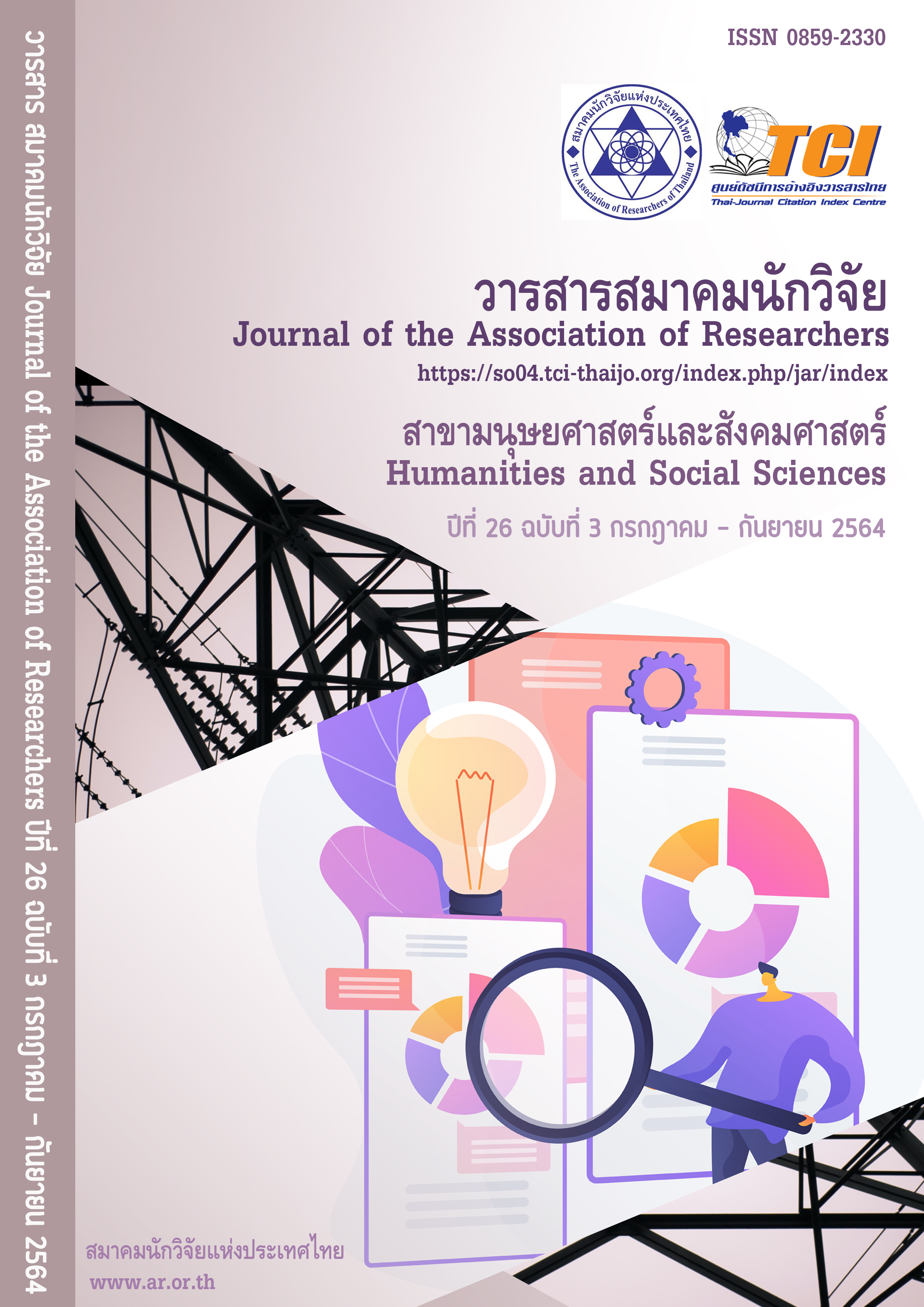The Effects of Group Activities on the Development of the Emotional Intelligence of Autistic Students at the Demonstration School of Ramkhamhaeng University (Secondary Level)
Main Article Content
Abstract
In this thesis, the researcher examines the effects of group activities on the development of the emotional intelligence of autistic students at the Demonstration School of Ramkhamhaeng University (Secondary Level). The sample population consisted of six autistic students in the Project for Potential Development of Children with Special Needs in Inclusive Education at the Demonstration School of Ramkhamhaeng University (Secondary Level) in the second semester of the academic year 2019. The research instruments consisted of a group activities program for the development of the emotional intelligence of autistic students and an evaluation form of emotional intelligence. Data were analyzed using percentage, mean (M), and standard deviation (S.D.). The comparison of the differences in emotional intelligence (EQ) prior to and after using group activities was conducted using the Wilcoxon Matched Pair Signed-Rank Test. Findings are as follows: The emotional intelligence (EQ) of all six autistic students under study prior to and after group activities exhibited differences at the statistically significant level of .05. EQ prior to the use of group activities was lower than after the use of group activities.
Article Details
บทความที่ปรากฏในวารสารนี้ เป็นความรับผิดชอบของผู้เขียน ซึ่งสมาคมนักวิจัยไม่จำเป็นต้องเห็นด้วยเสมอไป การนำเสนอผลงานวิจัยและบทความในวารสารนี้ไปเผยแพร่สามารถกระทำได้ โดยระบุแหล่งอ้างอิงจาก "วารสารสมาคมนักวิจัย"
References
กรมสุขภาพจิต. (2547). คู่มือความฉลาดทางอารมณ์. กรุงเทพมหานคร: ชุมนุมสหกรณ์การเกษตรแห่งประเทศไทยจำกัด.
คมเพชร ฉัตรศุภกุล .(2546). กิจกรรมกลุ่มในโรงเรียน. กรุงเทพมหานคร: ธนรัชการพิมพ์.
คะนึงนิจ ไชยลังการณ์. 2548. การเรียนรู้และความคงทนในการจำคำศัพท์ของเด็กออทิสติกที่ใช้โปรแกรมคอมพิวเตอร์สอนเสริม. ปริญญานิพนธ์การศึกษามหาบัณฑิต, มหาวิทยาลัยศรีนครินทรวิโรฒ.
ณัฎฐา สวยสด. (2549). การใช้กิจกรรมกลุ่มเพื่อพัฒนาการปรับตัวทางสังคมของนักเรียนชั้นมัธยมศึกษาปีที่ 2 ที่มีความบกพร่องทางร่างกายหรือสุขภาพ. วิทยานิพนธ์ศึกษาศาตรมหาบัณฑิต, มหาวิทยาลัยเชียงใหม่.
ทศพร ประเสริฐสุข. (2548). “ความฉลาดทางอารมณ์กับการศึกษา.” วารสารแนะแนวจิตวิทยา ทางการศึกษา. 4(10) : 94; กรกฎาคม-ธันวาคม
ทิศนา แขมมณี. (2536). “กระบวนการเรียนรู้โดยการทำงานกลุ่ม” วารสารครุศาสตร์. 5(5): 30-31 สิงหาคม – พฤศจิกายน.
ปัทมา เทียนชัย. (2558). กิจกรรมด้านศิลปะเพื่อพัฒนาพฤติกรรมความสนใจในการเรียนของเด็กออทิสติก. วิทยานิพนธ์การศึกษาศาสตรมหาบัณฑิต, มหาวิทยาลัยศิลปากร.
ปัทมา เวียงวุธ. (2556). ผลของการใช้กิจกรรมกลุ่มเพื่อส่งเสริมพฤติกรรมทางสังคมของนักเรียนออทิสติก. วิทยานิพนธ์การศึกษาศาสตรมหาบัณฑิต, มหาวิทยาลัยศิลปากร.
ผ่องพรรณ เกิดพิทักษ์. (2544). “คุณลักษณะที่เกี่ยวข้องกับ EQ.” สมาคมร้ายขายยา. 6(26) ; มีนาคม-เมษายน.
พันธีตรา สามารถ. (2550). การพัฒนาความฉลาดทางอารมณ์ และการสื่อสารของเด็กออทิสติก โดยใช้กิจกรรมศิลปะบำบัด. ปริญญานิพนธ์การศึกษามหาบัณฑิต, มหาวิทยาลัยมหาสารคาม.
ภูมินทร์ ทานิล. (2561). การศึกษาความสัมพันธ์ระหว่างความฉลาดทางอารมณ์กับการจัดการความขัดแย้งของผู้บริหารสถานศึกษาในสถานศึกษาขั้นพื้นฐาน สังกัดสำนักงานเขตพื้นที่การศึกษาประถมศึกษาเพชรบูรณ์ เขต 1. วิทยานิพนธ์การศึกษามหาบัณฑิต, มหาวิทยาลัยนเรศวร.
สุพัตรา ปราบพาลา. (2560). แนวทางการออกแบบส่วนต่อประสานเว็บไซต์ด้วยทฤษฎีสีและการจัดองค์ประกอบเพื่อส่งเสริมศักยภาพการเรียนรู้สำหรับเด็กออทิสติก กรณีศึกษาโครงการห้องเรียนคู่ขนานโรงเรียนเมืองเพชรบูรณ์. วิทยานิพนธ์วิทยาศาสตรมหาบัณฑิต, วิทยาลัยครีเอทีฟ ดีไซน์แอนเอ็นเตอร์เทนเมนต์เทคโนโลยี มหาวิทยาลัยธุรกิจบัณฑิต.
อภิรัฐ พิมพ์เขต. (2550). ผลการพัฒนาความฉลาดทางอารมณ์ (EQ) ของเด็กที่มีความบกพร่องทางการเรียนรู้
และเด็กออทิสติก ในศูนย์การศึกษาพิเศษประจำจังหวัดร้อยเอ็ด. ปริญญานิพนธ์การศึกษามหาบัณฑิต, มหาวิทยาลัยมหาสารคาม.
Gargiulo, Richard M. (2012). Special Education in Contemporary Society: An Introduction to Exceptionality. Los Angeles: SAGE. Publication, Inc.
Quill, K. A.Z. (2000). Do-watch-say: Social and communication intervention for children with autism.Maryland, MD: Paul H. Brookes.
Translated Thai References
Aphirat Phimket. (2007). The Outcomes of Developing Emotional Quotient of with Learning Disabled Children and Autistic Children at Changwat Roi-Et Special Education Center. Master of Education Thesis, Mahasarakham University.
Atchara Sukarom. (1999). "Experimentation and Validation of the Emotional Intelligence Scale of Schutt and Faculty." Bangkok: Srinakharinwirot University.
Charinee Wa Gene. (2005). The Study of Social Skills of Autism Children in Grade 6 Attendance from Peer Support Group Activity.
Department of Mental Health. (2004). Handbook of Emotional Intelligence. Bangkok: The Agricultural Cooperative Federation of Thailand Ltd.
Gargiulo, Richard M. (2012). Special Education in Contemporary Society: An Introduction to Exceptionality. Los Angeles: SAGE. Publication, Inc.
Kanongnit Chaiyalangkan. (2005). Learning and persistence in memorizing words of children with Autism using a computer program is a supplementary teaching program.
Khomphet Chat Suphakun. (2003). Group activities in schools. Bangkok: Thanarat Publication.
Pantheetra Samart. (2007). A Development of Emotional Quotient and communication of Autistic Children by Using the Art Therapy Activity. Master of Education Thesis, Mahasarakham University.
Pattamar Wiangwut. (2013). The Effects of Group Activities to Promote Social Behavior of Autistic Students. Master of Education Thesis, Silpakorn University.
Quill, K. A.Z. (2000). Do-watch-say: Social and communication intervention for children with autism. Maryland, MD: Paul H. Brookes.
Sri Ruen Kaew Kangwan. (2008). Psychology for life development at all ages. (Printed 15th time). Bangkok: Thammasat University Press.
Therdsak Dejkong. (1999). Emotional Intelligence. 4th edition, Bangkok: Matichon Publishing House.
Thitna Khaemmanee. (1993). “Learning process by the working group.” Journal of Education. 5 (5): 30-31 August-November.
Tossaporn Prasertsuk. (2005). “Emotional Intelligence and Education.” Journal of Educational Psychology Guidance. 4 (10): 94; July - December.
Weerawat Pannitamai. (1999). Emotional Intelligence (EQ): Happiness Index. And the success of life Bangkok: Expert Net.
Winadda Piyasilp. (1994). A guide for parents for children with autism. Bangkok: Plans Publishing.
Umaphon Trangkasombat. (2001). Create EQ for your child. Bangkok: Santa Printing.


